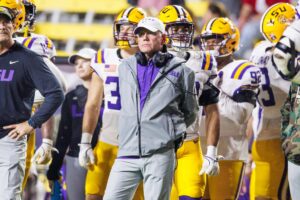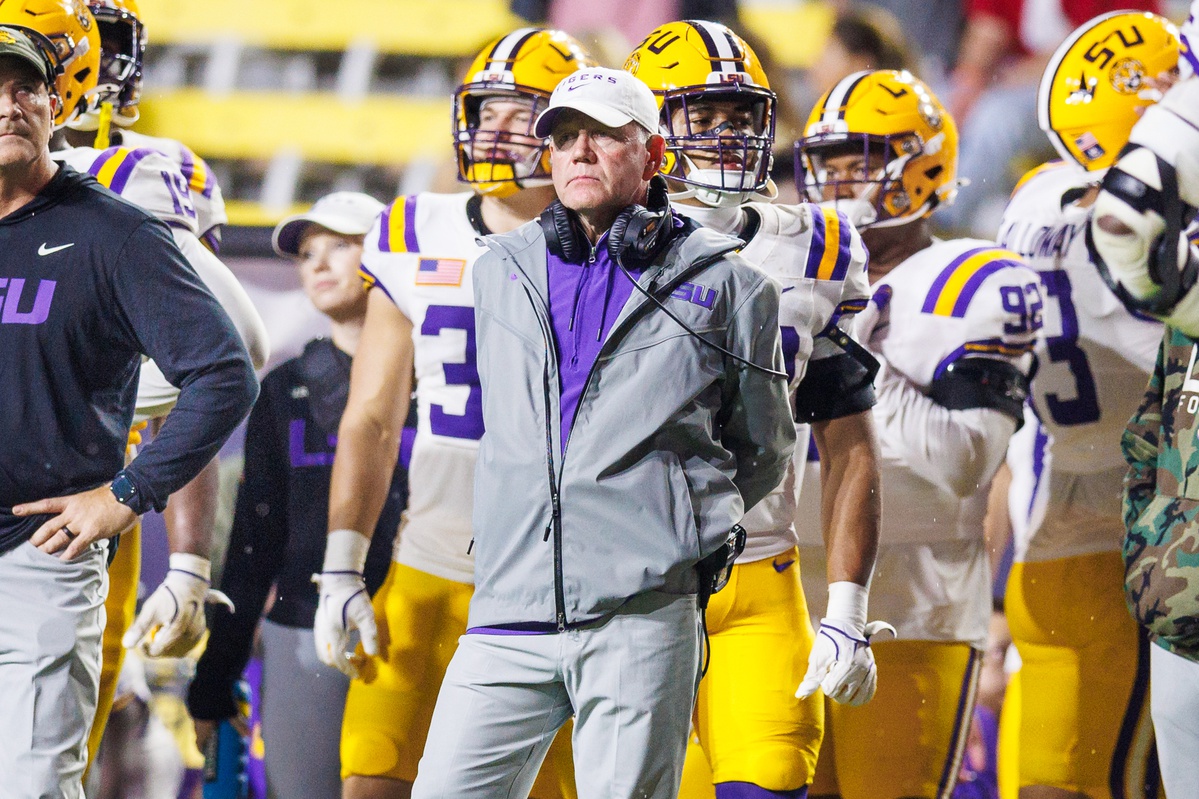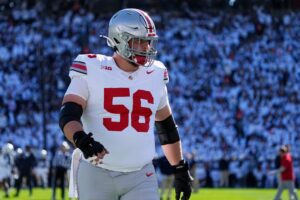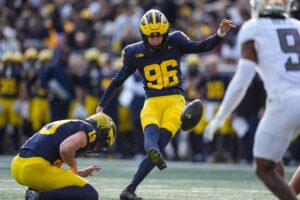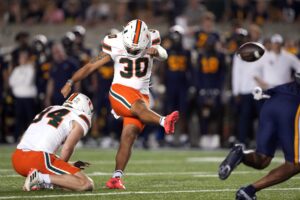The LSU Tigers had all the intangibles on their side leading up to a rivalry game against Alabama. A team can’t ask for much more than home field after two weeks to prepare with College Gameday on campus. LSU fell woefully flat against Alabama in a 35-6 loss in Tiger Stadium. Alabama gave the Tigers a reality check of where they are on the national stage. The nature of the LSU loss raises questions about the ceiling of the program as it stands.
LSU 35-6 Loss to Alabama
More of the Same
After a second-half collapse against Texas A&M, all the predictions surrounding the game revolved around LSU’s ability to stop running quarterbacks. Alabama got the ball first and quickly gave a glimpse of how the game would play out. Jalen Milroe was 3-3 passing on the first drive and finished it with a 39-yard rushing touchdown.
LSU finally found success running the ball, thanks to a 45-yard Caden Durham run on its first possession. That run fueled excitement and hope that this game would bring a different outcome than the last. Unfortunately, the Tigers would have to settle for a field goal after a Kyren Lacy drop in the end zone. At 7-3, this is as close as LSU would get in this game.
The Tigers failed to make Milroe uncomfortable as he went on to add another rushing touchdown in the first half. At the half, Milroe was 10-15 passing and had 98 yards rushing for two touchdowns. It was fairly obvious that the bye week didn’t help LSU in its preparation for Alabama.
The Collapse
As bad as things looked for the Tigers in the first half, they got the ball first in the second half with a chance to make it a one-possession game. Down 21-6, Garrett Nussmeier led LSU to one of its best drives of the night. The 14-play drive finally got Aaron Anderson involved and lasted over six minutes. Nussmeier threw an interception on second and goal that killed LSU’s momentum. The pick essentially ended the game in the second quarter.
There’s no shame in losing to Alabama, but the problem is how LSU lost. Milroe finished with 185 yards rushing. That’s more than he had against Western Kentucky, Tennessee, and South Carolina combined. Even more troubling, Milroe wasn’t touched on several of the runs.
Nussmeier averaged less than six yards per completion and threw two interceptions. The Tigers rushed for over four yards per carry but only ran 24 times. Zavion Thomas averaged nine yards per carry but ran only twice. Nothing the Tigers did defensively worked. Not much worked offensively. Even when LSU had sequences of successful plays the offense couldn’t finish drives.
Who’s to Blame?
Alabama proved to be a true contender, and we’ll give them credit for making a statement. However, there is no excuse to allow Milroe to average over 15 yards per carry when there was extra time to prepare for him. Sure, Milroe is a great player. But no team has given up that much yardage to him all year. LSU might not have Georgia’s personnel, but Vanderbilt held Milroe to 10 rushing yards. The defensive game plan did nothing to slow him down.
Offensively, 24 carries are not enough. Joe Sloan did a good job of using the motion and ball carriers we’ve begged to see, but he did nothing to build off the successful plays. If an end-around works, there’s no rule against running it again. One could even go crazy and play-action pass off the end around motion. Ju’Juan Johnson had a successful run from a direct snap. More personnel and play variations helped LSU’s struggling run game, but there has to be more of it.
Nussmeier is regressing. He lacks confidence and for good reason – he’s unsure of the looks he’s getting. Part of Nussmeier’s issues are due to a lack of balance, but excuses don’t win games. Down 35-6, he was content with taking checkdowns until a fallen receiver led to yet another interception. Nussmeier offers a great story of patience in choosing not to transfer. Backup Rickie Collins offers running ability that limits the looks of defenses and could invigorate LSU’s run game.
As disheartening as the defensive plan was, LSU’s limitations stem from personnel. The middle of the defense, meaning the defensive tackles, inside linebackers, and safeties, must be a strength for a defense to be elite. LSU’s defensive tackles are serviceable, but they are not the strength of the defense. The linebackers don’t diagnose quickly enough to beat blocks. No safety has stood out after nine games. LSU needs more game-changers defensively, but the young defensive tackles have promise.
Moving Forward
LSU’s loss forces the team to reassess its goals. It’s now obvious this isn’t a playoff-caliber team, so players must motivate themselves with other factors. Personal pride is critical at this point. We’ll soon find out which older players have the heart to insist on finishing on a high note. Younger players can put themselves in a position to earn larger roles next year.
Brian Kelly is tasked with evaluating himself and everyone else. This includes coaches and players. Nussmeier has struggled lately. Neither coordinator was impressive in this game. The Tigers have nothing to lose, and if nothing changes the pressure only mounts against Kelly. The Tigers have three games left to create positive momentum entering the off-season. It will take a team effort to avoid a complete implosion.
